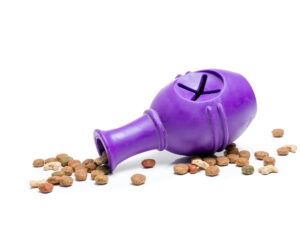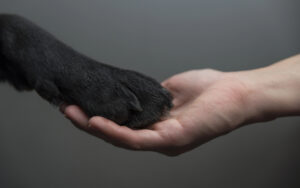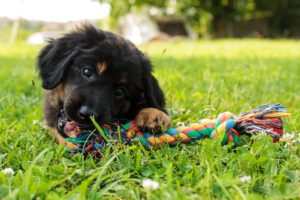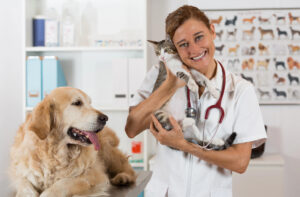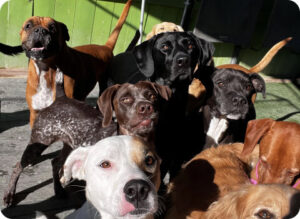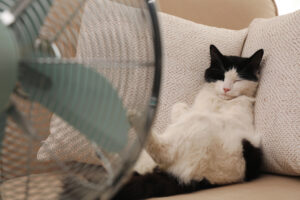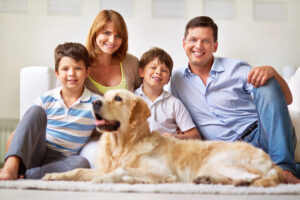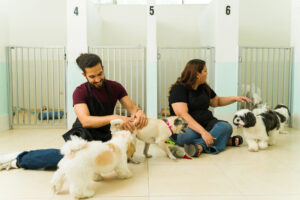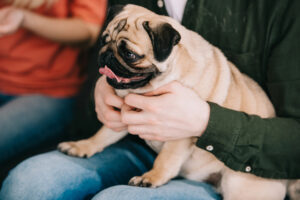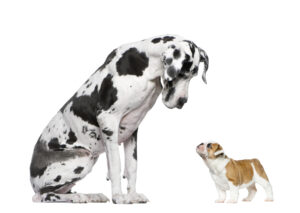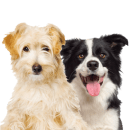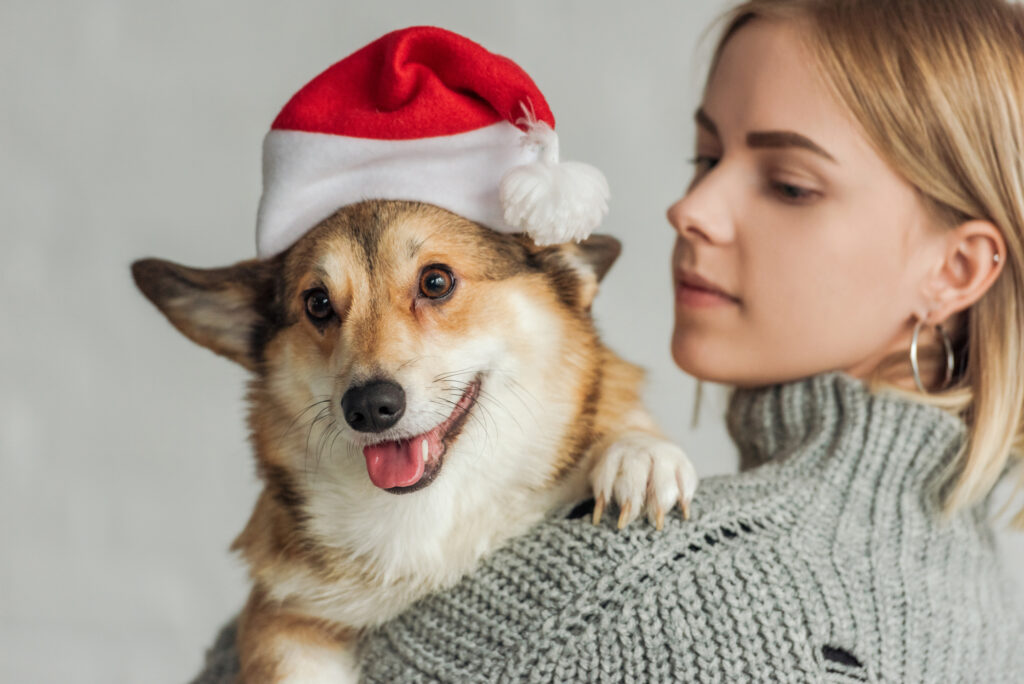
A Guide to Soothing Your High Anxiety Dog During Holiday Gatherings
Everyone looks forward to the Christmas season because it is a time to rejoice, celebrate, and spend time with those they care about. On the other hand, the holidays can cause stress and anxiety for our canine companions. Many animals, especially dogs and cats, experience anxiety when exposed to unfamiliar environments, unfamiliar sounds, and disruptions in their usual routine. It is our responsibility as pet owners to pay close attention to our animals and take precautions to make sure they are safe and well during this holiday season.

Boarding Clients!*Discount does not apply during holiday/peak rate periods.

Recognizing Anxiety in Pets
It is crucial to be able to identify the behavioral indications that animals use to communicate their fear to alleviate their discomfort effectively. Some of the most common signs of anxiety in pets are:
Backing away
When dogs encounter new people or places, they may show signs of anxiety, such as backing away or avoiding eye contact.
Aggression
Some pets’ aggressive behavior, including biting, snarling, or barking, is a response to worry.
Destructive behavior
As a coping mechanism, anxious pets may resort to destructive behaviors like chewing on furniture or shoes.
Restlessness
Symptoms of anxiety in pets can include restlessness, excessive pacing, or difficulty settling down.
Vocalization
When dogs and cats are anxious, it’s not uncommon for them to make a lot of noise, either by barking or meowing.
Defecating indoors
When pets experience anxiety, it can lead to inappropriate elimination behaviors including urinating or defecating indoors.
To recognize the signs of anxiety in your pet and offer the appropriate support, it is essential to understand their body language. You can make their environment more pleasant if you can tell when they are relaxed and when they are anxious.
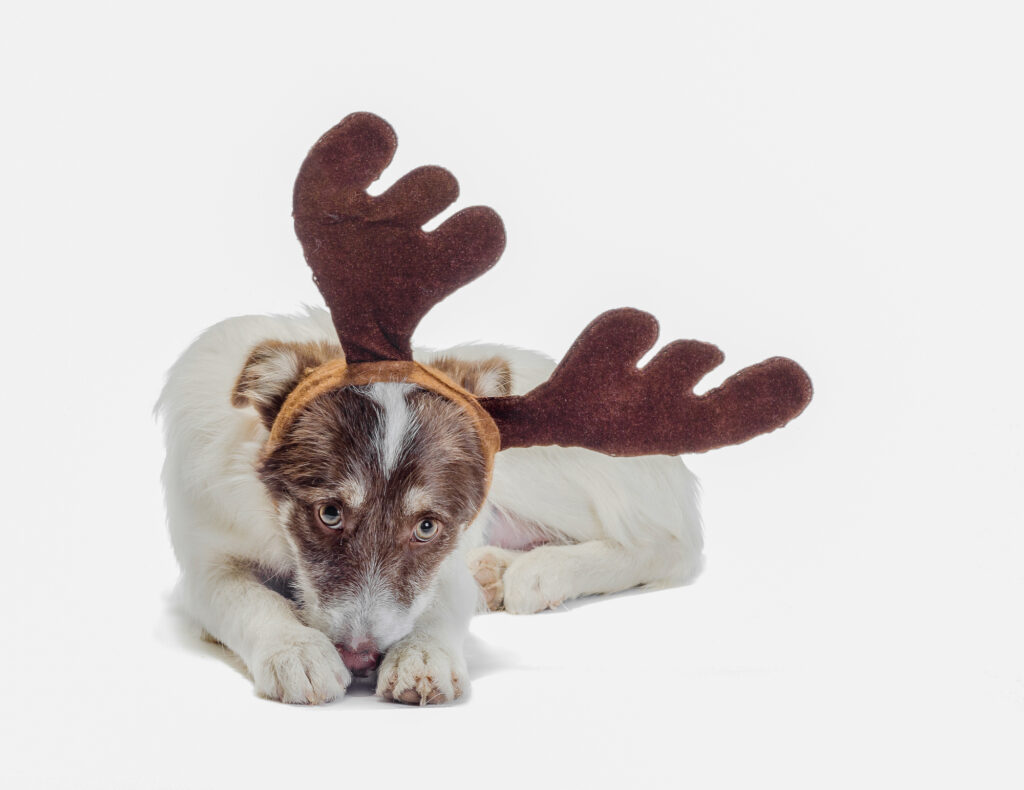
Remedies to Reduce Holiday Anxiety in Pets
The effectiveness of the many treatments on the market that promise to reduce anxiety in pets—including treats, aromas, CBD oil, and collars—has not been shown by science in every case. Manager of Shelter Behavior Services Liv Hagen claims that these items are more designed to calm people down than to help anxious animals.
Consulting with your veterinarian is one successful strategy. They can evaluate your pet’s condition, identify the source of their anxiety, and provide treatments, including medication, if needed.
Training Tips to Overcome Fear
If your pet suffers from anxiety, it may be best to combine products with training and socializing strategies. Through the processes of desensitization and counter-conditioning, your pet can be exposed to stimuli that cause anxiety in a controlled and positive setting over time. Over time, you can change their negative outlook on these experiences into favorable ones by rewarding them with valuable treats.
To alleviate anxiety in pets, it is essential to train them to obey, exercise regularly, and provide mental stimulation. Taking care of your pet’s emotional and physical requirements will make them feel more at ease even when you’re busy celebrating the holidays.
Prepare in Advance for Holiday Visitors
The best way to help your pet cope with holiday anxiety is to prepare. Here are a few things you can do right now:
Develop a secure environment
Make sure your pet has a peaceful place to go throughout the celebrations. Whatever makes them feel safe—a box, a certain room, etc.—can serve this purpose.
Exercise before festivities
Ensure your pet gets ample exercise before guests arrive. No worry or restlessness is likely to manifest if your dog is exhausted.
Prevent door dashing
Take precautions to prevent your pet from bolting out the door when guests arrive. Before their first frenzy dies down, you might want to think about putting them on a leash or using baby gates.
Be Your Pet’s Best Advocate
You must put your pet’s welfare first, as their champion, as a pet owner, even during the joyous Christmas season. Pay close attention to your pet’s reaction as you test out new treatments and training methods. You should either remove your pet from the potentially stressful environment or provide them with a secure place to retreat to if they appear to be in danger.
Thirty percent of dogs may suffer from anxiety, and sixty-seven percent of cat owners say their feline friends show symptoms of nervousness or dread. The mental and emotional well-being of your pet can be greatly improved if you pay close attention to its actions and requirements.
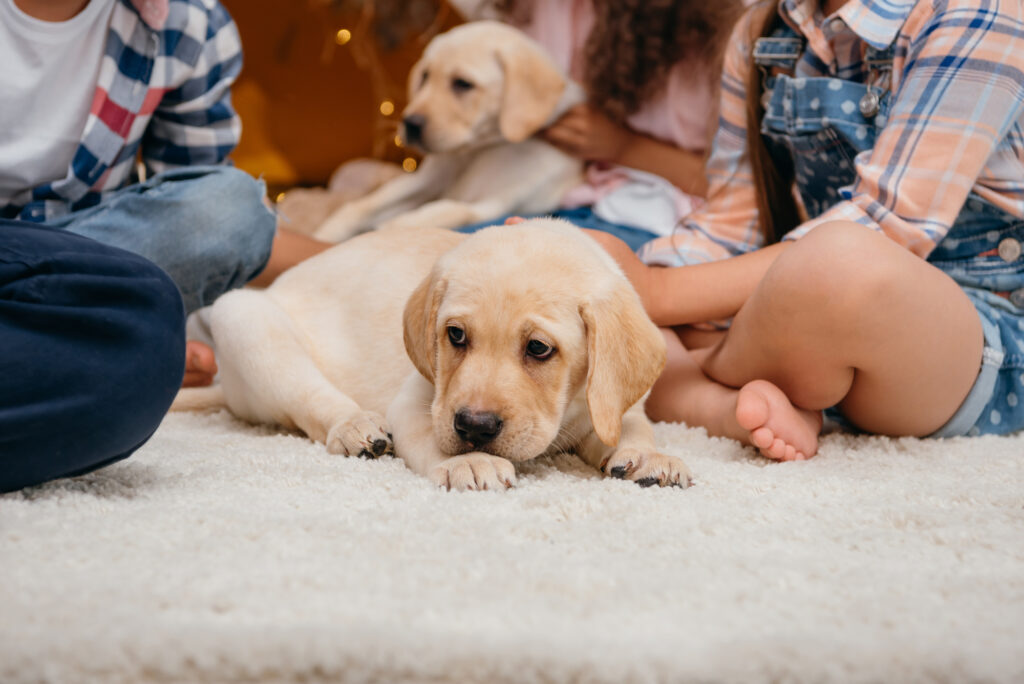
Signs of Anxiety in Pets During Gatherings
Pets may experience stress and anxiety if their hosts host too many social events. The well-being of dogs and cats must be able to recognize the signals of anxiousness during these types of occurrences. Keep an eye out for these indicators:
What Dogs Do When They're Nervous:
• Excessive panting
• Pacing excessive salivation and excessive vocalizations
• Excessive licking of themselves, you, or objects
• Dilated pupils
• Ears pulled to the side or back
• Tail hanging down or tucked under
• Shaking
• Feigned sleep
• Drinking more water
• Increased frequency of urination or defecation
• Not eating as much and staying close to their owners
• Hiding
Advice for Ensuring Your Pet's Comfort During Festive Occasions
Make Your Space a Secure One
Make sure your pet has a special place to calm down and unwind while guests are around. This can take the form of a peaceful bedroom furnished with soft, familiar bedding, soothing music, or white noise.
Training and Desensitization
Use counter-conditioning and desensitization techniques to progressively expose your pet to anxious stimuli. Use sweets as a reward for good behavior to help reinforce the desired attitude.
Use Enrichment Toys
Introduce new puzzle toys and offer long-lasting chews to keep your pet engaged and mentally stimulated.
Consider Pheromone Products
Use pheromone diffusers or sprays to create a calming atmosphere for your pet.
Put Your Pet at Ease
Set a relaxing mood by playing music that is specifically composed for pets.
Talk to Your Veterinarian
If your pet seems anxious, talk to your doctor about the option of giving them a supplement or prescription medication to help them relax.
You may ease your pet’s anxiety and stress this holiday season by following these preventative measures. As pet owners, it is our responsibility to make sure our furry friends are well and happy this holiday season so they can celebrate with us.

Frequently Asked Questions (FAQs)
How can I tell if my dog is experiencing anxiety during holiday gatherings?
Keep an eye out for changes in behavior including increased panting, pacing, aggressiveness, vocalizations, hiding, or hunger. Other signs of stress include restlessness, unusual behavior, and changes in body language such as dilated pupils or pulled-back ears.
Are there specific products proven to alleviate pet anxiety during the holidays?
The efficacy of anxiety remedies is debatable, while there are a variety of goods on the market, including chews, aromas, and CBD oils. Because every pet is different, it’s important to talk to your vet about what’s best for your pet when using these items.
How can I prepare my pet for holiday visitors?
Make sure your pet gets enough exercise before you leave, provide them with a special area to hang out, and think about putting up gates or other obstacles to keep strangers out. Their fear can be reduced through positive reinforcement and gradual introductions to new people.
Can training help reduce anxiety in pets?
Desensitization and counter-conditioning are two examples of effective training methods. You may assist your pet in adjusting to unfamiliar environments by rewarding good behavior with goodies and associating positive things with those that make them anxious.
Should I consult my veterinarian for anxiety remedies?
Your pet’s anxiety can be better managed with the help of medication, which your veterinarian can prescribe after evaluating your pet’s unique needs and making recommendations for effective interventions. It is essential to consult a specialist who can assess your pet’s unique needs.
What signs of anxiety should I look for in my cat during holiday events?
Keep an eye out for symptoms including a change in hunger, dilated pupils, flattened ears, increased vocalizations, changes in hiding behavior, or changes in how the cat uses the litter box. To alleviate feline anxiety, it is helpful to provide a peaceful area and keep an eye on how comfortable they are.
How can I maintain my pet's routine during the holidays?
Consistency is key when it comes to a dog’s schedule; regularity is what dogs need. Consistent routines, such as feeding times, play sessions, and walks, provide stability and reduce stress.
Are there specific training methods for dogs that get stressed when left alone?
Teaching your dog to sit and stay, gradually increasing the duration, can help with separation anxiety. Do your best to keep your appearances and departures from being overly dramatic so as not to draw attention to them.
Keep in mind that every pet is different, so it’s important to watch their behavior and talk to your vet to make sure they’re okay throughout the holidays.




